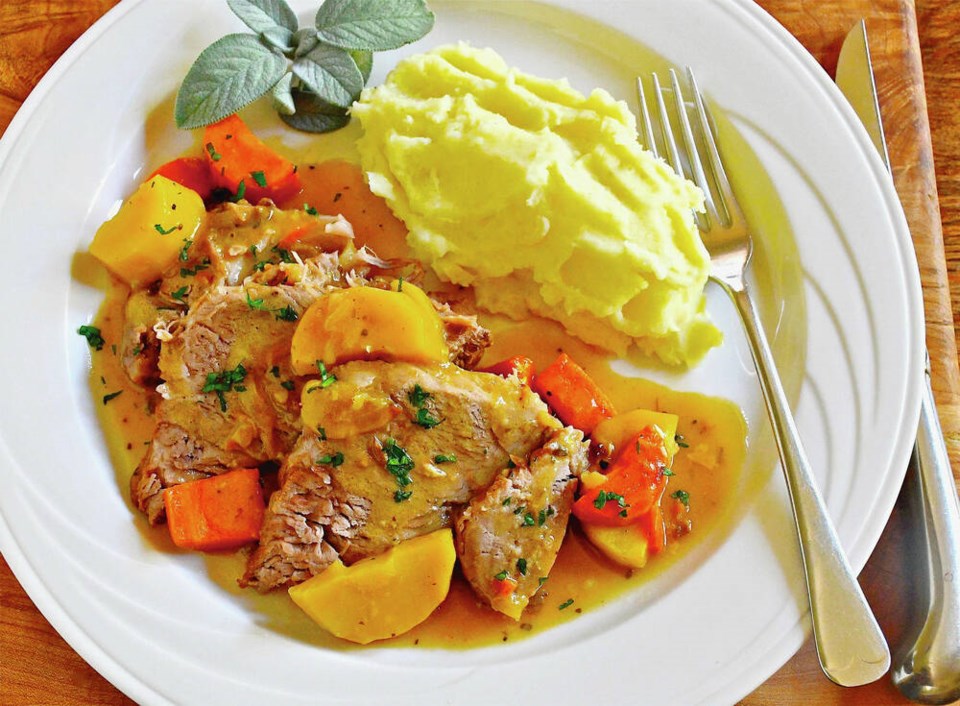Weather, obviously, affects what we feel like cooking. And, last week, when I read that some much needed rain and cooler temperatures were coming our way, the damp forecast made me want to make comfort food.
They are many dishes, of course, that fit into that category. But when I saw a nice looking boneless pork shoulder butt roast on sale at a grocery store I decided on a pot roast. Pot roast is often made with beef, but I can guarantee you a pork shoulder roast will work equally as well.
Pork shoulder butt roasts, and pork shoulder blade roasts, which can also be used in my recipe, are cut from the front section of the animal and include parts of the front leg and the section at the top of the leg, “the shoulder.” These cuts are well suited to use for a pot roast because the meat’s fat content causes it to become mouth-wateringly tender and richly flavoured when braised in the oven.
To prepare my pork pot roast, I first seared the roast in hot oil on all sides in a Dutch oven, and then transferred it to a plate. Sliced onions were then cooked in the Dutch oven, and then flour, mustard, garlic and sage were stirred in. Stock was slowly added, along with some apple juice and a splash of cider vinegar. The mixture was brought to a simmer, creating a braising mixture for the pork.
The pork was set back in the Dutch oven, covered and cooked in a 325 F oven 75 minutes. Cut carrots and parsnips were added to pork and it was cooked 60 minutes more, until the meat was very tender.
As the pork pot roast cooked, it filled my house with the most wonderful aroma, a sign that some tasty comfort food was being created. To round out the meal, you could serve the pork with mashed potatoes, which I flavoured with buttermilk. And, if you felt you needed something green on the plate, a steamed green vegetable, such as broccoli, Brussels sprouts or green beans would do nicely.
Tender Pork Pot Roast with Root Vegetables
Moderately priced pork shoulder butt roast, seared, and then braised until very tender in a richly flavoured stock mixture with onions, garlic, carrots and parsnips. Any leftovers could be enjoyed the next day or two or frozen for another time.
Preparation time: 30 minutes
Cooking time: about two hours 35 minutes
Makes: four to six servings
1 (about 1.13 to 1.25 kg/2 1/2 to 2 3/4 lb.) boneless pork butt or blade shoulder roast
• salt and freshly ground black pepper, to taste
2 Tbsp vegetable oil
1 large onion, halved and sliced
3 Tbsp all-purpose flour
2 Tbsp Dijon mustard
2 large garlic cloves, halved lengthwise, then thinly sliced, widthwise
1 tsp dried sage leaves, or 1 Tbsp finely chopped fresh sage (see Note)
2 3/4 cups chicken stock or broth, plus more, if needed (divided)
1/2 cup unsweetened apple juice
1 Tbsp cider vinegar
2 bay leaves
2 medium parsnips, peeled, halved lengthwise, and then sliced, widthwise, into 1-inch pieces
2 medium carrots, peeled, halved lengthwise, and then sliced, widthwise, into 1-inch pieces
• chopped fresh parsley, to taste (optional)
Preheat oven to 325 F. Season the pork with salt and pepper. Pour oil into a Dutch oven or ovenproof pot set over medium-high heat. When oil is hot, add the pork, sear on all sides, and then set on a plate.
Add the onion to the pot you seared the pork in and cook until softened, about two to three minutes. Mix in the flour, mustard, garlic and sage and cook and stir one to two minutes more. Slowly mix in 1/2 cup of the stock (or broth). When mixture becomes thick, slowly mix in the remaining 2 1/4 cups of the stock (or broth) and the apple juice. Mix in the vinegar and bay leaves and bring to a simmer.
Set the pork roast back in the pot. Cover and cook in the oven 75 minutes. Uncover the pot roast and add the carrots and parsnips. Cover again and cook 60 minutes more, or until the pork roast is very tender.
Remove pot from the oven, lift roast out, set it on a cutting board, tent with foil and let rest 10 minutes. While meat rests, cover pot and keep vegetables warm in a 200 F oven, adding more stock (or broth) to them if you find the sauce around them too thick.
When meat has rested, slice and plate the pork. Top with the saucy vegetables and serve.
Note: Dried sage leaves are sold in the bottled herb and spice aisle of supermarkets. It’s dried, crumbled sage leaves; don’t confuse it with powder-like ground sage.
Correction: Last week’s recipe for Butternut Squash Risotto with Walnuts and Sage didn’t include garlic in the ingredients list. You’ll need one medium clove, minced.
Eric Akis is the author of eight cookbooks. His columns appear in the Life section Wednesday and Sunday.



